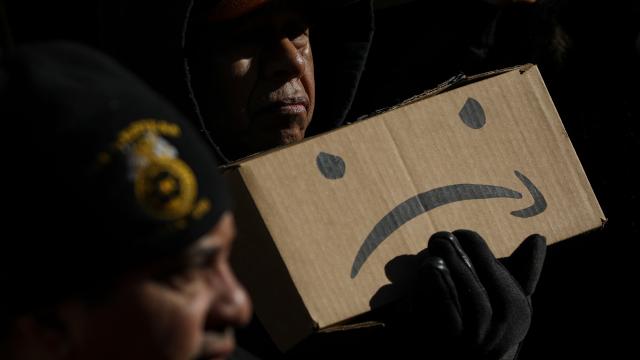Amazon just acquired the mesh networking startup Eero for an undisclosed sum. This is great news for Eero’s founders who are undoubtedly chin-deep in Bezos bucks, and it’s bound to be a great move for Amazon, which can now control an unknown number of people’s wifi routers. However, it’s cause for concern if you’re an Eero user who’s trying to avoid giving up your data to Amazon.
I’ve been a fan of Eero since the company first announced its intelligent wifi system four years ago. I even met Eero’s cofounder and CEO who was nice enough to come visit Gizmodo’s headquarters and show me an early prototype of the sleek white router, which could be connected to other Eero routers to create a mesh network of any size. Even better, the whole system was controlled with a handy smartphone app.
Its handsome industrial design and intuitive user experience made it seem like an Apple product, and I remember thinking to myself, “I bet Apple buys this company one day.”
Well, now Amazon has. I like to imagine that Apple would’ve been the parent company that made Eero work seamlessly with iOS and Mac devices while doubling down on the router’s privacy settings. Instead, we get Amazon, a company that’s probably going to shove these things down the throats of every Prime customer in existence. We also have to wonder if Amazon will take advantage of owning the primary internet access point for millions of Eero users.
Right now, Eero says that it gathers anonymized data like aggregate metrics to improve network performance. Importantly, the company also says that it doesn’t “ever track the websites you visit or collect the content of your network traffic.” There’s a little bit more wiggle room in the Eero privacy policy, for the most part, the policy is pretty clear that Eero’s not secretly tracking you in pernicious ways.
I reached out to Amazon and Eero to ask about any changes in data collection or the privacy policy. Amazon provided some background information. Eero did not get back to me, however, in a tweet, the router startup wrote, “…eero and Amazon take customer privacy very seriously and we will continue to protect it. eero does not track customers’ internet activity and this policy will not change with the acquisition.”
That seems pretty unequivocal, but let’s step back and look at Amazon’s track record. We know that Amazon has a history of collecting vast amounts of data about its users through its website by tracking what you browse and buy, as well as through its hardware products.
Take Alexa, for example. While Alexa usually only records your commands after you say the wake word, “Amazon processes and retains your Alexa Interactions, such as your voice inputs, music playlists, and your Alexa to-do and shopping lists, in the cloud to provide, personalise, and improve our services,” according to the Alexa Terms of Use. The Fire TV terms include similar allowances.
On its face, it’s innocent—who doesn’t want improved services?—but the consent you grant Amazon when you agree to terms is actually maddeningly vague. It could mean a lot of things. Take for example the Amazon Prime credit card, which is issued by Chase Bank. Gizmodo’s Kashmir Hill recently attempted to find out just how much Amazon learned about her when she spent money with her Amazon co-branded credit card.
Much to her chagrin, neither Amazon nor Chase would say in clear terms. One credit card expert told Hill that he suspects “there is a lot of data that they are mining from this,” which led her to the conclusion that the most private path is to use the card only for Amazon and Whole Foods purchases, since Amazon already knows what those are.
For all the unanswered questions about the specifics of Amazon’s data practices, it’s abundantly clear that the company makes lots of money by collecting data and leveraging it to steer its customers towards buying more stuff on Amazon. It’s also common sense that Amazon would approach a big acquisition like Eero by assuring customers that it would be very hands off and people that already loved the routers could continue to love them in the same way.
This is sort of like how Amazon bought Whole Foods, didn’t say anything about selling Echos in the produce aisle, and then a few months later, “Farm Fresh” Echos appeared alongside pyramids of citrus.
We don’t know what the company will do with its new little router maker in the long term. Maybe Amazon will slash the price, as it did with so many groceries after its Whole Foods acquisition. Probably it will promote the heck out of Eero devices by pushing them to the top of every Amazon search for wifi routers and by blowing them out on Prime Day next year.
Possibly, just possibly, Amazon will find new ways to use the routers to infer more about customers and sell them more junk. Amazon controls the pipes that power the internet’s backbone through AWS. It’s the largest online retailer by far.
Just imagine how much more it could learn about you if it controlled your wifi router. Or don’t. It’s pretty scary.
